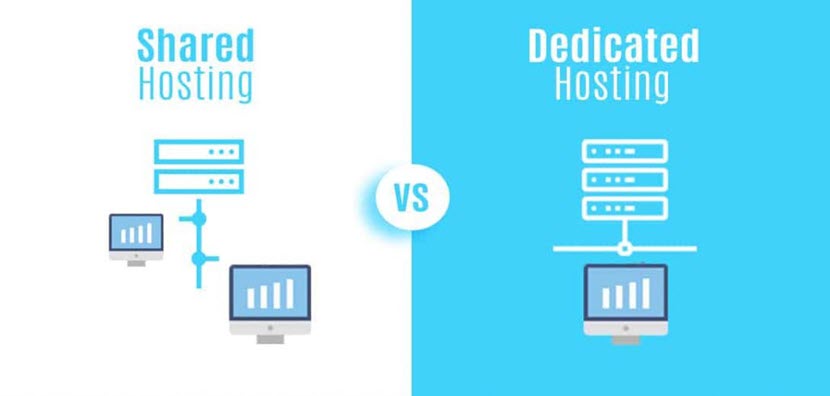For any business, establishing an online presence is no longer a matter of choice. In this sense, finding the right hosting environment for their website is one of the pivotal decisions owners need to make.
Two options have emerged as the principal hosting solutions available today – shared hosting and dedicated hosting. While shared hosting is economical and beginner-friendly, dedicated hosting offers full control and unparalleled possibilities for customization and expansion. Both hosting types have their own set of advantages and drawbacks and the decision which to choose depends on the unique needs and goals of the business.
In this article, we will take an in-depth look at the pros and cons of shared vs. dedicated hosting, helping you to find the hosting solution that best aligns with your requirements and plans for the future.
What Is Shared Hosting?
Shared hosting is a type of hosting where multiple websites share the resources of a single server. The common metaphor used to describe shared hosting is that it is akin to living in an apartment block, where amenities, such as electricity, water, elevators, and communal areas, are shared with other residents. In the case of a website, shared resources include bandwidth, CPU, memory, and storage.
Who Benefits from Shared Hosting?
Shared hosting is most suitable for small businesses, people just starting out, and those without much technical expertise. It comes at an affordable price because the cost of maintenance and operation is distributed among different users. Furthermore, it is easy to manage as it usually comes with a user-friendly control panel.
What Is Dedicated Hosting?
Dedicated hosting means that a website gets exclusive use of a server and resources, such as CPU, RAM, bandwidth, and storage. It much resembles owning a house, where every space and facility is your private domain to be used and managed as you wish.
Who Benefits from Dedicated Hosting?
Dedicated hosting is the best choice for enterprises, high-traffic websites, and users who wish to retain strict control over their environment. This solution offers dependable performance, greater security, and flexibility but also requires significant financial investment and technical skills.

Shared Hosting vs. Dedicated Hosting – What are the Differences?
Both hosting solutions come with their own unique set of features that can be beneficial or limiting, depending on your needs. Choosing between the two requires that you have a clear understanding of the demands the website will be under, the budget available, and how much technical know-how you have.
Below we provide a breakdown of the main differentiating factors to consider when choosing the best option.
Resources
Shared hosting: Multiple websites share server resources, such as CPU, bandwidth, RAM, and storage. For this reason, resources may fluctuate depending on the changing needs of the other websites hosted on the server.
Dedicated hosting: One website or application gets exclusive use of all server resources, which ensures their stability and predictability.
Performance
Shared hosting: Performance can be inconsistent and experience slowdowns during traffic spikes and over-utilization of resources by another site.
Dedicated hosting: Typically delivers consistent high-performance as it is not affected by other websites.
User-friendliness
Shared hosting: Does not require advanced technical knowledge as it is designed for beginners and usually comes with user-friendly control panels (e.g., cPanel, Plesk).
Dedicated hosting: Generally, requires technical expertise and comes with a steeper learning curve, especially if the user is provided with root access.
Configuration
Shared hosting: Customization options are limited as users must settle for the software and OS already installed on the server.
Dedicated hosting: Offers high configurability and full control over the server environment; users are free to select the OS, software versions, and other setups.
Security
Shared hosting: Comes with the possibility of contagion if one site gets compromised (i.e., the “bad neighbor” problem). Implementation of custom security measures is also limited.
Dedicated hosting: As the server is isolated from others, the user can apply specialized security measures and tools.
Management
Shared hosting: The hosting provider manages all operations, ensuring that they run smoothly and without the need for user intervention.
Dedicated hosting: Depending on the type and whether it is managed or unmanaged, users might have to intervene to ensure optimal operation.
Maintenance
Shared hosting: All maintenance tasks, such as software updates and security patches, are performed by the hosting provider.
Dedicated hosting: User involvement in maintenance depends on whether the hosting is managed (none required) or unmanaged (required).
Scalability
Shared hosting: Hosting providers enable scaling through different hosting tiers, but options might be limited.
Dedicated hosting: Scalable on demand but requires installing hardware upgrades or adding additional servers.
Cost
Shared hosting: Budged-friendly because resources are shared.
Dedicated hosting: Demands greater financial investment due to the exclusivity of resources and premium features.
Support
Shared hosting: Hosting providers offer standardized support for common issues experienced by users.
Dedicated hosting: Support is typically more specialized and also includes priority assistance around the clock.

Advantages & Disadvantages of Shared Hosting vs. Dedicated Hosting
Whether you choose shared or dedicated hosting depends on multiple factors. To help you decide, here is a breakdown of the benefits and drawbacks of using shared hosting vs. dedicated hosting:
| Shared Hosting | Dedicated Hosting | |
| Pros | Economical User-friendly Quick to setup Managed maintenance | Exclusive use of resources Reliable high-performance High customization level Root access Scalable Isolation from other websites Greater security |
| Cons | Limited resources Fluctuating performance Limited configurability Higher security risk Lack of full control Limited scalability | More expensive Requires technical know-how to set up and manage |
Which Is Better for My Business – Shared or Dedicated Hosting?
Before choosing between shared or dedicated hosting, website owners need to consider their specific needs, goals, and budget.
Shared hosting is an excellent choice for projects that expect modest traffic and resource use, beginners, or small businesses, including:
- Blogs and personal websites
- Small local businesses
- Freelancers
- Smaller non-profit organizations
- Landing pages for startups
- One-off event websites
On the other hand, dedicated hosting gives the necessary resources and control to websites that expect high traffic, use complex applications, and prioritize performance, albeit at a premium price. Examples of dedicated hosting users include:
- Ecommerce websites
- Streaming services
- Gaming servers
- Large corporations
- Financial institutions
- Healthcare providers
- SaaS companies
- Educational institutions

Who Wins the Hosting Showdown?
In essence, each hosting solution caters to different needs, and there is no “one-size-fits-all” answer. The “best” option for you is the one that aligns most closely with your current requirements and abilities and the growth you expect from your website. For this reason, before going shopping for hosting solutions, it is crucial to make an assessment of where you are at the moment and where you see your business in the future.



